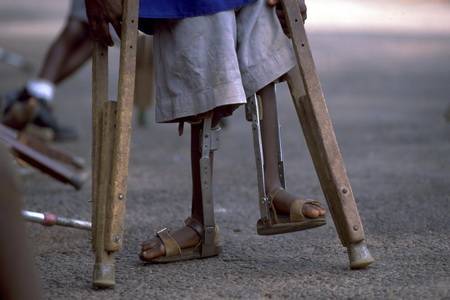As Nigeria celebrates news that polio is no longer an endemic in the West African country, Pakistan and its war-battered neighbour Afghanistan remain the only two countries where the disease is prevalent. In Pakistan, reports have emerged stating that despite continued immunisation campaigns, around 440,000 children, aged less than five years, in the country have never been administered polio drops, including 245,000 in Balochistan, 75,000 in Sindh, 60,000 in the Federally Administered Tribal Areas (Fata) and 51,000 in Khyber Pakhtunkhwa (KPK). Thisis a critical situation for the children because having been deprived of vaccination they are at a very high risk of being infected with the polio virus. These reports are a serious blot on the performance of the concerned government machinery. Our country, even after 75 percent reduction in from last year’s polio cases and nine months into the current year, houses 93 percent of the global polio cases.
To eradicate polio virus from the world, a global campaign has been in operation since 1988 and in the outcome of committed efforts of all states, today the crippling virus has gone extinct all over the world except in Pakistan and Afghanistan which are the only hindrance in defeating the virus completely. Even the poorest and most war-torn states have succeeded in stamping out the virus completely.
Despite the technical knowledge and financial assistance provided by international donor agencies, Pakistan has failed to get rid of polio. In 2014, 306 polio cases were reported and in the current year with 75 percent decline, 30 cases have still been recorded across the country which is 93 percent of the sum globally reported polio cases. According to the World Health Organization (WHO), as long as a single child remains infected, children in all countries are at risk of contracting polio.
It is insanity to endanger the lives of children by refusing to let workers administer anti-polio drops to them. There are a number of chronic cases involving parents refusing have their children vaccinated against the crippling disease. In Khyber Pakhtunkhwa (KPK) province, more than 25,000 people refused to vaccinate their children with anti-polio vaccines in the recently concluded three day immunisation drive. The refusal to vaccinate children against polio virus is incomprehensible; however, there are no detrimental side effects of the vaccination. But the reports reveal that the refusal for vaccination itself has proven to be harmful for children. The tragedy lies in the fact that according to reports of the chronic refusal cases, even educated parents are reluctant to administer anti-polio vaccines to their children.
Our culture is the main reason of polio’s persistence in Pakistan. Our society is based on patriarchal family system in which male members possess dominant position. They alone have authority to make all decisions and women have no share in decision-making. Women, especially in rural areas, are locked away from the outside world and children remain with them most part of the day. Women and children’s medical treatment is restricted by the fathers in the family. The fathers of rural area’s children think that polio drops will make their children sterile. This thinking is the result of the brainwashing conducted by Muslim extremist clerics who fuel rumours that the children who are vaccinated would be sterilized. The sole objective of elongating the rumours and misinformation is to enforce their authority.
Dr Muhammad Usman Chachar, the Sindh provincial coordinator of the Emergency Operations Centre (EOC) – a collaboration of various stakeholders including WHO, UN, the federal and provincial governments and volunteer organization the Rotary Club, which is making integrated efforts for the eradication of polio virus – warned that the eyes of the world are fixed on Pakistan, the state that reports a lion’s share of the worldwide reported polio cases. The country is under a colossal pressure to stamp out the crippling virus instantaneously. The failure will lead to Pakistan suffering dire consequences, most likely leading us to be disconnected from the whole world when travel bans to and from Pakistan will be imposed.
It is the biggest challenge for Pakistan to attain the status of a polio-free state. Keeping in view the international state of affairs, Pakistan has to take concrete, fool-proof and result-oriented initiatives in this perspective. There is a need for the implementation of an effective mobilization mechanism for changing the mind set of people and remove lingering doubts about polio vaccines’ efficacy in order to administer polio drops to vulnerable children. The high risk areas or sensitive localities where both security concerns and parental refusals exist are to be focused conscientiously. Recently polio campaign has been started in high risk areas of the country amid tight security. To make the vaccination drive successful, it is important to include expert female social mobilizers in the drive who have direct access to the mothers of never vaccinated children. They must be charged with the task of enlightening these women about the efficacy of vaccination and ramifications of the refusal of polio vaccination. Other than that, services of broad-minded religious scholars, leaders and the local dignitaries, who have ingrained their influence in the sensitive areas, should necessarily be availed.






